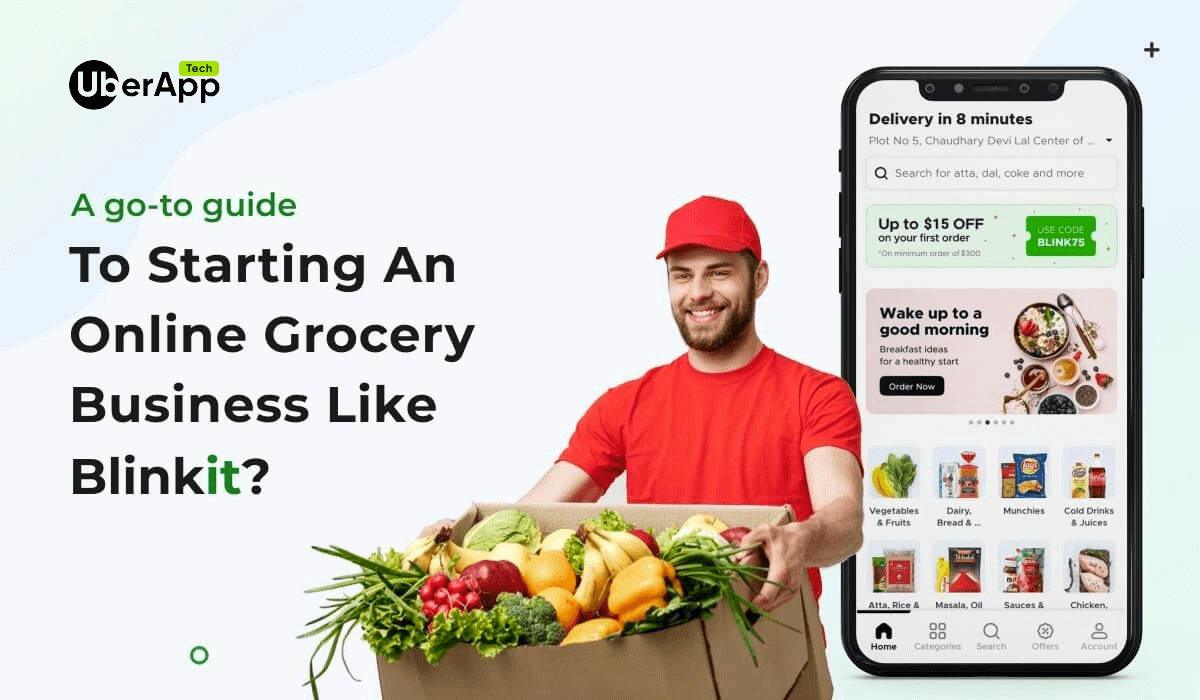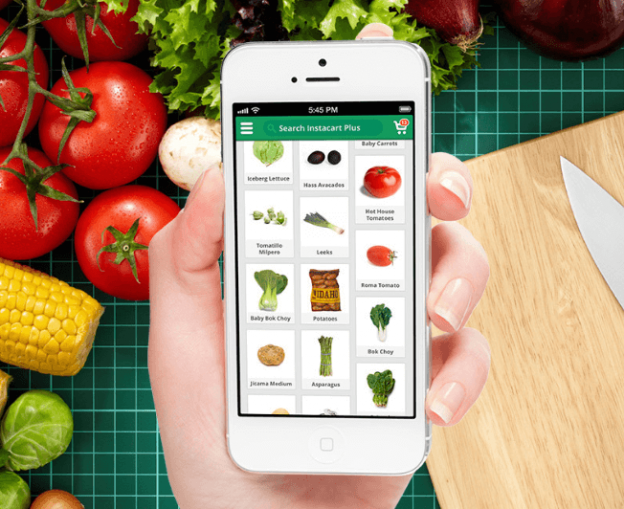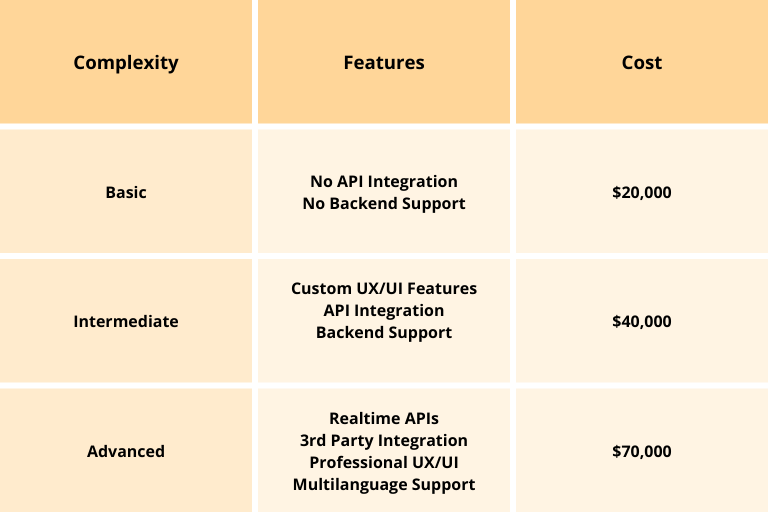
Started as a startup for providing quick grocery delivery on customers’ doorsteps, Blinkit has come a long way since its inception in 2013. As per a report from Statista, the on-demand grocery business had a revenue of 27.25 billion Indian Rupees (over USD 340 billion) in 2021. With the global online grocery market size at USD 285.70 billion in 2022, this worldwide phenomenon to start an online grocery business is hardly a surprise!
One reason for such a huge boost in this sector is affordable internet services and everyone being more accustomed to shopping online. And this implies that there has never been a better time to start an online grocery business like Blinkit than now.
Are you looking to make the most of this lucrative market opportunity? This detailed guide will give you an overview of all the necessary steps you must take to start a profitable online grocery business like Blinkit.
It’s remarkable how Covid 19 has boosted the online grocery business globally. As per a survey, Covid-19 led to a 9-12% surge in contactless shopping of e-groceries, especially from fresh and frozen categories. Interestingly, before the world came to a standstill, these numbers ranged from 3-4%. Interestingly, what made the grocery business grow unprecedentedly was also evident in other e-commerce business sectors as well.
As per a study, today, a major part of our population is dependent on the conventional source of income – working 40-60 hours a week in an office. This working pattern leaves people no time to do the basic day-to-day things, like buying groceries and other essentials. With more people operating on the same working pattern, people would want to use their limited time doing something valuable. Like spending time with their family & friends or pursuing a hobby.
And with everyone equipped with a smartphone, the online grocery business is more likely to grow in the coming times.
No matter how lucrative this grocery delivery business sounds, it has its shortcomings. Let’s take a look.
This is no secret to the world anymore. With Covid-19 boosting the online grocery business exponentially, it is getting the attention of major investors like never before. As a result, the online grocery sector is facing strong competition.
With people having multiple options to select from, it is becoming a game of – who is providing better services at a cheaper price. In addition, competitors also use discounted rates on products to lure in customers. So, even if one accomplishes to drive sales with such offers eventually, it doesn’t leave them with high-profit margins.
If you opt for an inventory-based online grocery business, you need to have high storage capacity warehouses. And with groceries like fruits and vegetables, you will also need to refrigerate them efficiently to avoid degradation. For that, you need significant capital investment to get things running.
You can get away with bad word of mouth if you are running a regular store. For online stores, you can’t afford to do so, especially at the start of a business. So, you need to ensure the timely delivery of the correct food items at the right address on every order. With multiple orders on the go, it could be a difficult task to pull off. However, this can be accomplished with well-trained staff and an efficient delivery management system.
The name of your business should contain everything there is to know about your business. However, that’s not necessary. If you could choose a name that can easily be recalled and remembered by your service consumers, great!
Getting your business registered is one of the initial requirements for any business. Here are some crucial aspects of the business registration process.
Pro Tip: Often the local and regional rules for business registration are different. So, it’s understandable if it gets a bit confusing for you. If it feels like a bit of a hassle to get your business registered, you could hire a legal advisor for easy proceedings.
Now, the business model for your grocery store dictates how your business operates from point A to Z. And so, to make money from an online grocery business like Blinkit, the business model is divided into three categories.

This is one of the go-to business model types for a profitable grocery delivery business adopted by major players in the industry like Zomato, UberEats, etc. In this model, you are the middleman between the grocery store and the customer. You simply provide a website or application to both parties and manage orders. This is how it happens.
Here’s how you make money from this model.
The inventory-based business model works wonders in efficiently managing the overall process. Here, all the grocery is stored in an inventory warehouse where their quality is ensured. An in-house or a third-party delivery agent picks up the order and delivers it to the customer. This reduces the chances of delivering bad-quality food products to customers.
In this model, you can make commissions as follows,
Unlike the multi-vendor, the business owner has all the rights to select a vendor for the customer order. In addition, the system also uses in-house delivery agents. This business model is used by many e-commerce startups like Instacart, Amazon, etc. Here, the majority of earnings come from,
Once you select a business model, the next important aspect to start an online grocery business like Blinkit is an application. A lot depends on the look and feel of an application. Here are the three basic types of grocery delivery businesses to choose from.
If your requirement for an app is minimal, a ready-made application would be a great option to entertain. The application needs some minor changes, like brand name, icons, and aesthetics, and you can claim it as yours. But for that, you need to find a development company with a product that offers all the features you want.
Though it’s comparatively a cheaper option than a custom build, you might have to settle in terms of the UX/UI design. Also, you won’t be able to add additional features if you want.
Whether it’s UX/UI design, the icons, features, or the entire layout of the application, a custom build application can have everything you want. You will have more control over app design, and development. It also offers a great opportunity to accompany everything that your competitors lack, like ease of use, navigation, etc.
However, the flexibility that a custom-build app provides comes with a higher price tag. Also, it takes more time to develop a custom app than the other options.
A subscription-based app comes with a variety of pre-build applications ready to deploy once you subscribe to their services. Once subscribed, the service providers rebrand the application name as yours.
Now, even when it’s the easiest and cheaper way to start an online grocery business, you don’t have full control over all aspects of the application.
The better the services you would want to offer to your customers, the better the features you will have to integrate into your application. For one thing, it should be working on reliable technology and offer an engaging interface to the customers. Here are some of the basic features you must have from a customer’s point of view.
The ease with which a customer travels from point A to B on your online grocery application determines whether he/she will continue using your services or not. As per a basic rule of thumb – if you could make it understandable to a kid, the navigation is great.
Having a couple of payment options always comes in handy. Check the trending payment methods being availed on competitors’ websites. You must offer more than the conventional payment methods, like payment in cryptocurrencies or Buy Now Pay Later options. This way you will be able to attract different types of customers.
Today, almost everybody likes to be aware of their order – where has it reached, is it out-for-delivery yet, what’s the status of the order? So, you must have a tracking system to keep your customers updated on their orders.
If you choose a ready-to-launch business model, it would be better if you provide your customers with multiple stores to choose from. Not only it’s convenient for customers, but you can also benefit from varying commission rates from different vendors.
The click & connect option was trending during pandemic. This is how it goes – a customer selects the food items and the store he wants to buy from. Later, he either collects it directly from the store or at a pick-up point.
Today, even when the effect of the Covid-19 pandemic has receded to a major extent, it hasn’t completely gone yet. With new Covid-19 waves hitting us time and again, there’s a chance of people still wanting to pick up their order from a nearby store or a common pickup point.
The app development process eventually boils down to one question – how much does it cost? Well, it all depends on certain factors. Let’s take a look at them.

A ‘Basic’ feature version with no APIs & backend support will cost you up to $15,000 – $20,000. However, the ‘Intermediate’ and ‘Advanced’ versions with custom UX/UI features, real-time APIs, backend support, and more can cost up to $40,000 and $75,000 respectively.
If you choose to launch it on Android and iOS, it will cost around $65,000 and $70,000 respectively. However, it will cost even more if you launch it on both platforms.
Sometimes, you need to spend thousands of dollars before you could make a penny. The statement holds true when it comes to entering a competitive business such as online grocery delivery. You need to market your brand and its services as efficiently and effectively as possible. Here are some of the result-oriented marketing techniques you could use.
As per a study from SmartInsights, 58.4% of the world’s population uses social media platforms like Facebook, Instagram, Snapchat, and more. With half of the world online, you can build your brand and drive organic traffic to your app/website.
You can run ‘app download’ campaigns to boost downloads of your online grocery delivery business. And if you want to increase your user base and boost engagement on the application, you could run ‘reach’ and ‘engagement’ campaigns.
QR codes are one easy way to boost download and customer engagement on the app.
Who doesn’t love a good discount? It’s a sure-shot way of attracting new customers. However, you need to ensure your grocery ordering experience stands out from the competitors.
As per a study, email marketing accounts for USD 36 ROI on every dollar spent. These stats are good enough to invest in email marketing for your business.
Another great way of marketing your application is direct contact with vendors who are interested in your application.
As per a report, the market for the global online grocery delivery sector was valued at USD 285.70 billion. And it is projected to grow at a CAGR(Compound Annual Growth Report) of 25.3% by 2030. This is beyond encouraging statistics for you to grab onto this lucrative opportunity!
However, starting any business is a huge step forward, let alone a highly competitive one like online grocery delivery or rental marketplace. It involves huge capital investment, thorough industry knowledge, and precision at each step of the process, especially when building an app.
If this feels like a lot to handle, Code Brew is here to make it easy for you! Our team of experienced individuals has a track record of building apps for several industries, including on-demand taxi services, online food delivery, and more. Check out our portfolio here!
So, what are you waiting for? Contact us to get a demo!
September 26, 2022